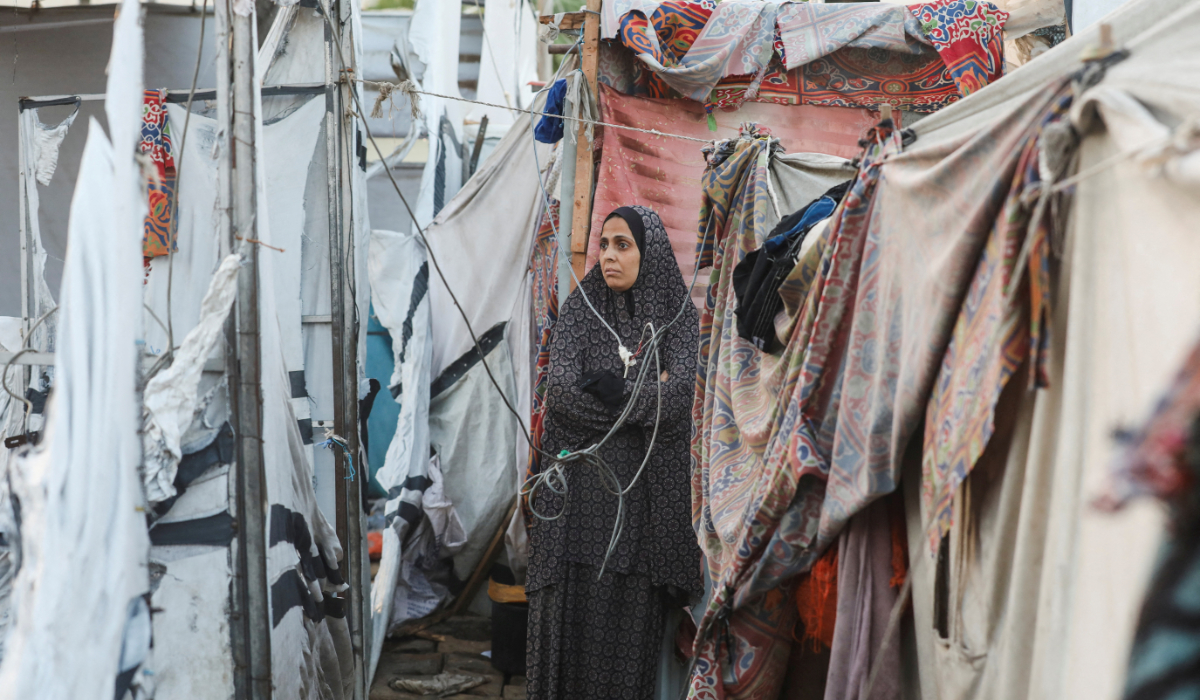WASHINGTON: The Biden administration has warned Israel that it must increase the amount of humanitarian aid it is allowing into Gaza within the next 30 days or it could risk losing access to US weapons funding.
Secretary of State Antony Blinken and Defense Secretary Lloyd Austin warned their Israeli counterparts in a letter dated Sunday that the changes must occur. The letter, which restates US policy toward humanitarian aid and arms transfers, was sent amid deteriorating conditions in northern Gaza and an Israeli airstrike on a hospital tent site in central Gaza that killed at least four people and burned others.
A similar letter that Blinken sent to Israeli officials in April led to more humanitarian assistance getting to the Palestinian territory, State Department spokesman Matthew Miller said Tuesday. But that has not lasted.

A Palestinian woman looks on at the site of an Israeli strike on tents sheltering displaced people, amid the Israel-Hamas conflict, at Al-Aqsa Martyrs hospital in Deir Al-Balah in the central Gaza Strip, October 14, 2024. (REUTERS)
“In fact, it’s fallen by over 50 percent from where it was at its peak,” Miller said at a briefing. Blinken and Austin “thought it was appropriate to make clear to the government of Israel that there are changes that they need to make again, to see that the level of assistance making it into Gaza comes back up from the very, very low levels that it is at today.”
For Israel to continue qualifying for foreign military financing, the level of aid getting into Gaza must increase to at least 350 trucks a day, Israel must institute additional humanitarian pauses and provide increased security for humanitarian sites, Austin and Blinken said in their letter. They said Israel had 30 days to respond to the requirements.
“The letter was not meant as a threat,” White House national security spokesman John Kirby told reporters. “The letter was simply meant to reiterate the sense of urgency we feel and the seriousness with which we feel it, about the need for an increase, a dramatic increase in humanitarian assistance.”
An Israeli official confirmed a letter had been delivered but did not discuss the contents. That official, speaking on condition of anonymity to discuss a diplomatic matter, confirmed the US had raised “humanitarian concerns” and was putting pressure on Israel to speed up the flow of aid into Gaza.
The letter, which an Axios reporter posted a copy of online, was sent during a period of growing frustration in the administration that despite repeated and increasingly vocal requests to scale back offensive operations against Hamas, Israel’s bombardment has led to unnecessary civilian deaths and risks plunging the region into a much wider war.
“We are particularly concerned that recent actions by the Israeli government, including halting commercial imports, denying or impeding 90 percent of humanitarian movements” and other restrictions have kept aid from flowing, Blinken and Austin said.
The Biden administration is increasing its calls for its ally and biggest recipient of US military aid to ease the humanitarian crisis in Gaza while assuring that America’s support for Israel is unwavering just before the US presidential election in three weeks.
Funding for Israel has long carried weight in US politics, and Biden said this month that “no administration has helped Israel more than I have.”
Humanitarian aid groups fear that Israeli leaders may approve a plan to seal off humanitarian aid to northern Gaza in an attempt to starve out Hamas, which could trap hundreds of thousands of Palestinians who are unwilling or unable to leave their homes without food, water, medicine and fuel.
UN humanitarian officials said last week that aid entering Gaza is at its lowest level in months. The three hospitals operating minimally in northern Gaza are facing “dire shortages” of fuel, trauma supplies, medications and blood, and while meals are being delivered each day, food is dwindling, UN spokesman Stephane Dujarric said.
“There is barely any food left to distribute, and most bakeries will be forced to shut down again in just days without any additional fuel,” he said.
The UN humanitarian office reported that Israeli authorities facilitated just one of its 54 efforts to get to the north this month, Dujarric said. He said 85 percent of the requests were denied, with the rest impeded or canceled for logistical or security reasons.
COGAT, the Israeli body facilitating aid crossings into Gaza, denied that crossings to the north have been closed.
US officials said the letter was sent to remind Israel of both its obligations under international humanitarian law and of the Biden administration’s legal obligation to ensure that the delivery of American humanitarian assistance should not be hindered, diverted or held up by a recipient of US military aid.
Israel’s retaliatory offensive since the Oct. 7, 2023, attacks by Hamas has killed over 42,000 people in Gaza, according to the territory’s Health Ministry. It does not differentiate between fighters and civilians but has said a little more than half the dead are women and children. The Hamas attacks killed some 1,200 people in Israel, mostly civilians, and militants abducted another 250.
The United States has spent a record of at least $17.9 billion on military aid to Israel since the war in Gaza began and led to escalating conflict around the Middle East, according to a report for Brown University’s Costs of War project.
That aid has enabled Israel to purchase billions of dollars worth of munitions it has used in its operations against Hamas in Gaza and Hezbollah in Lebanon. However, many of those strikes also have killed civilians in both areas.




































